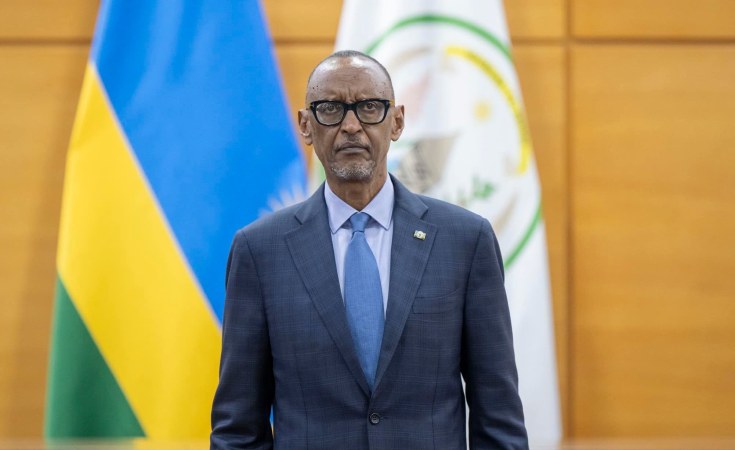President Paul Kagame has refused to blink, at least not first, on the diplomatic impasse with Rwanda's neighbours DR Congo, telling the African Union that his country will neither hesitate nor apologise in its commitment to safeguarding the security of its citizens.
"Rwanda will never hesitate or apologise for protecting the security of its people," Kagame said. "Nor will we seek permission to do so."
Kagame was speaking at a mini-summit hosted by President João Lourenço of Angola to address the root causes of the ongoing insecurity in eastern DR Congo, including bad governance, ethnic discrimination and violence.
At the meeting dubbed, "Silencing the guns in Africa," Kagame and Tshisekedi did not shake hands as the Mwalimu Julius Nyerere Peace and Security Building was filled with tension.
Congolese President Felix Tshisekedi has long accused Rwanda and Kagame of providing military support to M23 rebels.
Rwanda has always denied the accusations, and instead counter that Kinshasa was backing FDLR - a militia group largely responsible for the 1994 pogrom in Rwanda in which over a million people, the majority of them from the Tutsi ethnic group, were slaughtered.
"We lost over one million people during the Genocide against the Tutsi. Nothing and no one will be allowed to take us back," Kagame said.
During the second Congolese war in the 1990s, Rwanda and Uganda fought proxy wars in Kisangani city in eastern DR Congo, backing armed groups and seeking influence in the mineral-rich region.
While there are more than 120 armed groups fighting over land and control of valuable minerals in Congo's eastern regions, it is the M23 question that has caused the deepest rifts in the Great Lakes region.
The latest iteration has been similar to past incidents where the M23 fighters capture major towns only to retreat under a ceasefire agreement. However, the Congolese Tutsi fighters have often kept their influence in North Kivu.
'Adolf Hitler'
During last year's presidential elections, Tshisekedi and opposition candidates Moise Katumbi, Martin Fayulu, and Dennis Mukwege all promised to end the insecurity. But the incumbent drove the decibels in his rhetoric a notch higher, at one point likening Kagame to Adolf Hitler.
"I'm going to address Rwandan President Paul Kagame and tell him this: since he wanted to behave like Adolf Hitler by having expansionist aims, I promise he will end up like Adolf Hitler," Tshisekedi a rally in Bukavu, the capital of South Kivu province.
He said Congo's neighbours have "eyes bigger than their stomachs" and accused Rwandaof wanting to monopolise the wealth, particularly mining, in eastern DR Congo.
The United Nations and human rights groups accuse M23 of atrocities, including rape and mass killings, with the backing of Rwanda but Kagame says his country stands resolute in its commitment to safeguarding the security of its citizens.
He told the AU Summit that FDLR and their integration into the Congolse military FARDC must be addressed. The FDLR fled into Congolese jungles in July 1994 as Kagame's RPF forces marched into Kigali and ended a 100-day ethnic killing of the minority Tutsi.
Since then, Rwanda has accused the group of making repeated incursions into its territory and abducting or maiming citizens. But Kinshasa maintains this is a textbook excuse by Kagame to continue to peddle his influence on Africa's largest nation.
"There is no use arguing with those who have repeated their lies long enough, they have come to believe them," Kagame said even as he made a semblance of concession by indicating that Rwanda remains committed to peace through the established regional processes and mechanisms.
Kagame also presented his report as leader of the Institutional Reform of the African Union, indicating that the Peace Fund had been revitalised with $400 million mobilised, member states contributions at an all time high.
The 37th Ordinary Session of the Assembly of Heads of State and Government of the African Union kicked off on Saturday at at the African Union Headquarters in Addis Ababa, Ethiopia.
The theme of the year 2024 is, "Educate and Skill Africa for the 21st Century".


